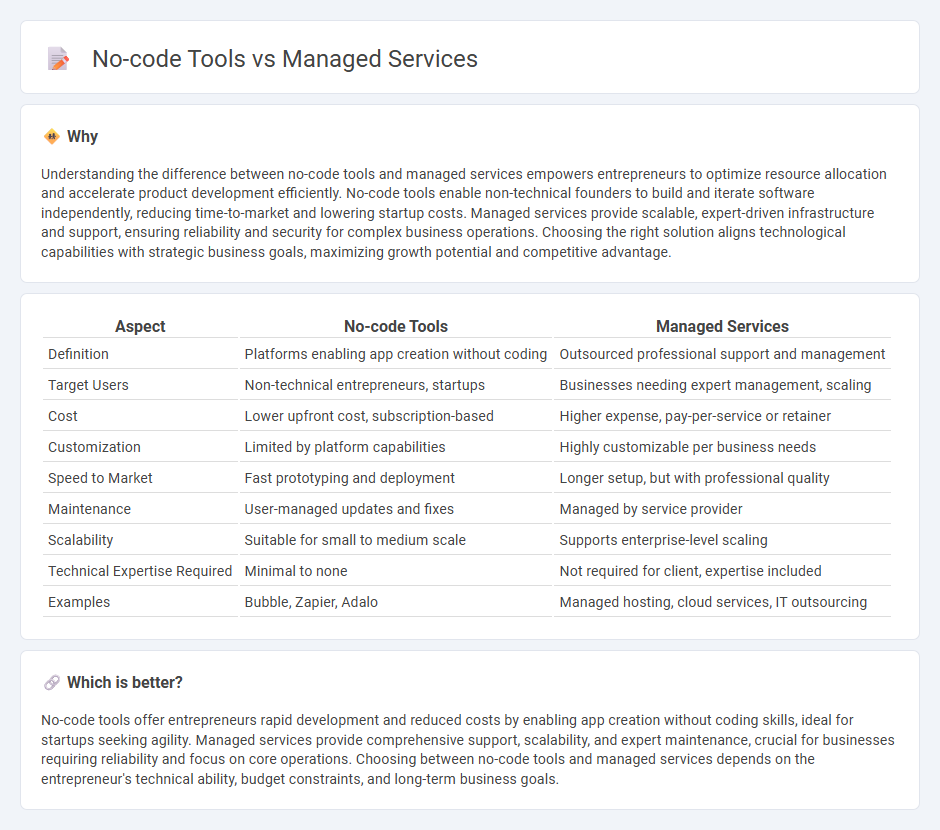
No-code tools empower entrepreneurs to build software applications rapidly without coding expertise, accelerating time-to-market and reducing costs. Managed services offer comprehensive IT support and infrastructure management, allowing startups to focus on core business operations while ensuring scalability and security. Explore how these solutions can transform your entrepreneurial journey and optimize your business growth.
Why it is important
Understanding the difference between no-code tools and managed services empowers entrepreneurs to optimize resource allocation and accelerate product development efficiently. No-code tools enable non-technical founders to build and iterate software independently, reducing time-to-market and lowering startup costs. Managed services provide scalable, expert-driven infrastructure and support, ensuring reliability and security for complex business operations. Choosing the right solution aligns technological capabilities with strategic business goals, maximizing growth potential and competitive advantage.
Comparison Table
| Aspect | No-code Tools | Managed Services |
|---|---|---|
| Definition | Platforms enabling app creation without coding | Outsourced professional support and management |
| Target Users | Non-technical entrepreneurs, startups | Businesses needing expert management, scaling |
| Cost | Lower upfront cost, subscription-based | Higher expense, pay-per-service or retainer |
| Customization | Limited by platform capabilities | Highly customizable per business needs |
| Speed to Market | Fast prototyping and deployment | Longer setup, but with professional quality |
| Maintenance | User-managed updates and fixes | Managed by service provider |
| Scalability | Suitable for small to medium scale | Supports enterprise-level scaling |
| Technical Expertise Required | Minimal to none | Not required for client, expertise included |
| Examples | Bubble, Zapier, Adalo | Managed hosting, cloud services, IT outsourcing |
Which is better?
No-code tools offer entrepreneurs rapid development and reduced costs by enabling app creation without coding skills, ideal for startups seeking agility. Managed services provide comprehensive support, scalability, and expert maintenance, crucial for businesses requiring reliability and focus on core operations. Choosing between no-code tools and managed services depends on the entrepreneur's technical ability, budget constraints, and long-term business goals.
Connection
No-code tools empower entrepreneurs to rapidly develop digital solutions without extensive programming knowledge, accelerating product launches and reducing development costs. Managed services complement these tools by providing expert IT support, maintenance, and scalability, ensuring business operations run smoothly and securely. Together, no-code platforms and managed services enable startups to innovate efficiently while focusing on core business growth.
Key Terms
Scalability
Managed services offer scalable infrastructure and expert support that enable businesses to handle increasing workloads efficiently without compromising performance. No-code tools provide rapid deployment and easy customization but often face limitations in scaling complex operations or integrating with advanced systems. Explore how each approach supports business growth and scalability by learning more about their capabilities and best use cases.
Customization
Managed services offer tailored solutions with deep customization options, enabling businesses to meet specific requirements through expert support and flexible integration. No-code tools provide user-friendly platforms for rapid development but often have limitations in advanced customization, making them suitable for simpler workflows. Explore how choosing between managed services and no-code tools impacts customization capabilities and business agility.
Operational Efficiency
Managed services provide businesses with expert support to streamline IT operations, reduce downtime, and optimize resource allocation, resulting in enhanced operational efficiency. No-code tools empower organizations to automate workflows and build custom applications quickly without extensive coding knowledge, accelerating process improvements and reducing time-to-market. Explore how combining managed services with no-code platforms can maximize your operational efficiency and drive business growth.
Source and External Links
Managed services - Wikipedia - Managed services involves outsourcing the responsibility for maintaining and anticipating the needs of various processes and functions, usually IT-related, to improve operations and reduce costs via a managed service provider (MSP) under a service level agreement (SLA).
What are managed IT services? - Red Hat - Managed IT services are tasks handled by a third-party MSP who proactively manages IT infrastructure and functions to reduce costs, improve service quality, and free internal teams, typically under an SLA with a fixed monthly fee.
What are Managed Services? Definition and Overview | TSIA - Managed services is a partnership where the MSP delivers proactive management and support of IT systems, cloud, cybersecurity, HR, accounting, and help desk functions to ensure operational excellence and allow clients to focus on core activities.
 dowidth.com
dowidth.com